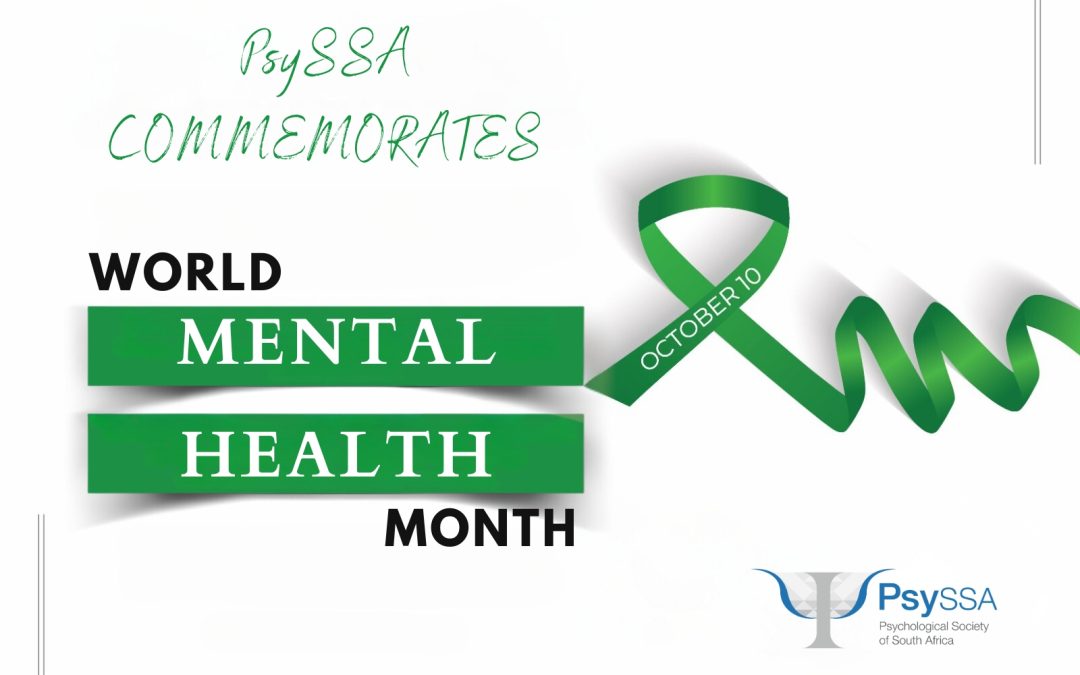A Call to Action: October is Mental Health Month!
written by Prof Theo Lazarus, Fatima Peters, and Dr Kyle Bester for the Division for Research and Methodology
Mental health challenges leave no age, socio-economic, gender, educational or occupational group unscathed. From young children to the elderly, mental health challenges, generally referred to as stress, anxiety, or depression, have increased exponentially and it is time to act with conviction and fervour.
Although mental health has been recognised as a critical part of human life, a stark realisation of the vulnerability of individuals to stressful events became evident during and following the COVID-19 pandemic. The global COVID-19 pandemic has led to a widespread increase in depression, anxiety, and post-traumatic stress disorder, particularly due to the sudden and untimely loss of loved ones and high levels of uncertainty. As we look ahead, providing support to one another and striving to promote mental well-being for people around the world are paramount.
The recent spate of athletes who have either left their respective sporting pursuits permanently or temporarily or resorted to self-destructive behaviours, is unprecedented. The adage that ’good physical health equals good mental health’ is being challenged daily. The impact of mental health challenges on individuals and families, as well as on employers, has become pervasive in modern societies. Furthermore, the technological uptake of online interaction for work and learning has added to the burden on people’s mental health and finding new ways to manage school and work environments contributes to the mental burden. At an individual level, self-care is important especially when managing demanding work and learning environments. Economical but high reward physical and social activities can enhance work life balance and address aspects of stress, anxiety, and depression.
Like physical health, mental health requires regular ‘maintenance’ sessions to identify areas of potential emotional or relational difficulties. Without regular self-appraisal by the individual (in the case of an adult) or by a parent (for a child) or a partner in adulthood, mental health challenges may quickly escalate into crises of daily life that impact health, educability, relationships, employability, and society as a whole.
Ongoing strife between countries and ethnicities continue across the globe, filtering across media platforms and leaving a sense of doom, helplessness, and despair. There is likely to be a numbing of emotions at the continuous and increasing destruction of people, leaving a sense of despair that plays out in aberrant behaviours in daily life.
It has been long recognised that mental health difficulties are at the core of most physical illnesses, often described as the psychosomatic component of health and disease, and therefore constitute a foundational pillar of all health programmes. Against this background, a call is made for individuals and families to protect and enhance their mental health as well as that of their loved ones, particularly in the pervasively traumatic circumstances that confront societies worldwide. In light of these living conditions, access to psychological services should become part of all healthcare provisions across countries, and increased attention to training mental health professionals should be given utmost urgency.
Therefore, mental health professionals, and particularly health care professionals in South Africa, should consider availing their services, where possible, to communities where they work, to include financially disadvantaged communities in their service offerings. Group interventions and activities that facilitate affordable psychological wellness would meaningfully connect people to each other for support and further the creation of sustainable support networks.
To achieve the above, we call on the South African government to make available suitable and appropriate compensation, treatment, and recovery environments to mental health professionals. In addition, a significant effort should be made to destigmatise psychological interventions in communities by showcasing the impact appropriate interventions have on individual and family functioning and society in general. Furthermore, the South African government should consider making available funding instruments for mental health care professionals to provide psychological support services with the aim of initiating interventions that can be sustainable for the communities most vulnerable and in need in South Africa.

